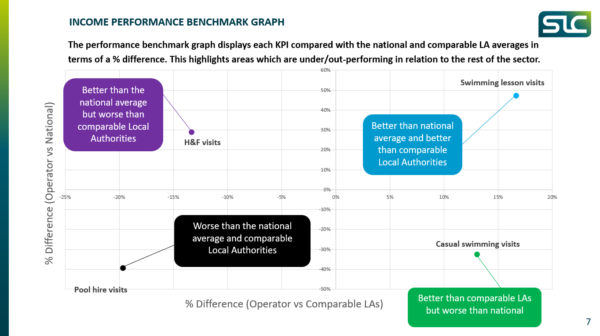Virtual Think Tank
‘Managing the Recovery of Local Government Leisure Services’
20 August 2020
Summary Report
The Sport, Leisure and Culture Consultancy (SLC) facilitated an online Think Tank – ‘Managing the Recovery of Local Government Leisure Services’ for local authority clients on 20 August 2020 from 3pm-4.30pm.
Facilitation was provided by Toby Kingsbury and David Rushton, SLC Directors, supported by Judith Schrenk, SLC Research Consultant.
Participants:
- Michael Constantine (Harrogate Borough Council, Head of Culture, Tourism and Sport)
- Heather Travis (Barrow-In-Furness Borough Council, Community Services Contracts Lead)
- Ryan Vittles (Southwark Council, Leisure Monitoring Officer)
- Stefania Horne (LB Hounslow Council, Head of Parks and Sport)
- Yousef Haider (LB Hounslow Council, Commercial Contracts Manager)
- Liz Slater (Plymouth City Council, Leisure Partnerships Manager)
- Simon Allaway (East Staffordshire Borough Council, Leisure Services Contract Officer)
- Gemma Ryan (Sandwell Council, Business Manager – Sport & Leisure)
- Ashoke Chaudhury (Southwark Council)
- Michael Shepherd (Slough Borough Council, Leisure Development and Client Manager)
- Charlotte Jackson (SLC, Research Consultant).
Agenda
- How can you be confident that your operating partner is performing at expected levels as the market recovers?
- Are you clear on what financial information your operating partner should be providing through the recovery period to inform a truly transparent and open book review of financial performance?
- Are you clear on what other, non-financial information might be required to ensure the strategic priorities of the service and the needs of all user groups are met within a period of strong commercial focus by your operating partner?
- Could you benefit from ‘live’ comparable benchmarks from the wider leisure operating sector to help measure how your operating partner is performing compared to the rest of the market?
- How can you be assured your operating partner is managing their costs effectively through the recovery period and is the recovery of income in line with the wider market?
- How can you be assured your services are being restarted in accordance with your operating partner’s recovery plan?
- At what point can you start to consider risk transfer to your operating partner and ultimately a return to a pre-Covid management fee position where achievable?
- What are the longer-term implications post-COVID for your sport and physical activity strategy, potential leisure investment, procurement, and affordability?
Summary
What are the challenges faced by local authorities in reopening centres and planning ahead to the future?
Delegates reported largely positive feedback from customers after reopening their facilities to the public. With amended opening hours, booking systems, rigorous cleaning protocols and ensuring social distancing in centres, customers’ responses to the precautions taken have generally been positive. Most have undertaken a phased approach to reopening, with health and fitness gyms and studios being the first services to be re-introduced along with lane swimming and plans are in place to restart swimming lessons over the coming weeks. External factors, such as neighbouring authorities having opened their facilities or political pressures, have played a role in some Councils‘ decisions to reopen. A fear of losing market share has also been prevalent amongst leisure operators who were very keen to ensure they reopened along with the private gym market.
Getting facilities to the point of reopening has been very challenging and whilst the response to leisure facilities reopening has largely been positive, delegates recognise that planning for the next 6-9 months is critical. Local authorities and operators in the early stages of their leisure management contract have a longer period to recover the loss of revenue but planning ahead is more challenging for Councils whose leisure contracts are due to end and those in procurement processes. Councils working with different operators across a large portfolio of facilities have faced additional challenges in coordinating and scenario planning.
A number of local authorities have entered into short-term financial agreements with their operators to enable them to reopen centres to the public. The level of uncertainty regarding the recovery period has made financial planning difficult and the extent of required financial support has been a challenging message for senior officers to manage with elected Members. Agreements are typically based on a provisional level of financial support which is to be reviewed on a regular basis through an open book approach of actual income and expenditure. It is key to ensure the right level of financial information is provided, in sufficient detail and in a format that allows for easy comparison with the projected figures. SLC recommend early agreement with the operator on the information to be provided and by when to ensure all parties are clear on the review process. It is also advisable for Councils to not commit to a specified period of support to ensure expectations can be managed in terms of the recovery period and the potential for further lockdowns.
How can you be confident that your operating partner is performing at expected levels as the market recovers?
Full transparency in reviewing the operator’s financial information through an open-book approach will be key for leisure partnerships moving forward. With Councils providing such significant levels of financial support, ]officers need to be fully informed on how the facilities are performing in terms of usage and income but also how costs are being managed. Detailed supporting information on key areas of expenditure such as staffing, utilities and maintenance should be requested and suitable resource applied to the review process to ensure proper scrutiny. Whilst there is a balance to be achieved between scrutinising an operator’s numbers and maintaining a good relationship moving forward, Councils should be demanding of their operators to provide the right level of information and in a timely manner. Despite the focus being primarily upon the core financial information, SLC also recommend that the operator provides ongoing reports on the phased restarting and delivery of programmes and other non-financial information such as customer feedback to ensure the Council has good visibility on operational issues.
Councils are keen to understand how best to monitor a leisure operator‘s performance against their forecasts and to benchmark their local operator’s income and visitor numbers. Seeking an understanding of how they are performing compared with the wider market will provide useful insight and leverage as part of the review process.
A tool to benchmark operators‘ performances will be key in the recovery of the sector. Quest NBS are producing a support package tailored to the Covid-19 crisis to help local authorities benchmark KPIs such as expenditure, equalities and customer experience. SLC, together with 4Global, have developed a tool that compliments the Quest / NBS product. SLC’s Local Authority Performance Monitoring Tool uses information generated through the 4Global Datahub which captures and analyses live income data from 1,500 leisure facilities across the UK. Data consistency is guaranteed through the central datahub, for which most major operators have signed up. The tool enables local authorities to track actual live financial performance of their sites linked to all the core income areas of a leisure operation and to maintain ‘real-time’ visibility on how the wider market is responding. Comparable local authorities will be selected for the user – the leisure operator’s performance data will be benchmarked against the performance of the comparable local authority’s leisure service. The tool generates a bespoke report with a visualisation of the data through a series of user-friendly graphs.

The benefits of the SLC and 4Global Local Authority Benchmarking Tool include:
- The tool will allow users to provide your senior officers and elected Members with quarterly / monthly benchmarked updates on performance based on the most up to date ‘live’ validated income and participation data
- Support the reconciliation process and negotiation of ongoing funding support on a quarterly basis to ensure your local authority’s funding support is optimised and creating the best possible conditions for recovery and risk transfer
- Understand the impact in the event of any recurrences of COVID-19 in your local area and what this means for your leisure operating partnership, recovery plans and future support funding.
For more detail on the Local Authority Benchmarking Tool, please email help@slc.uk.com

